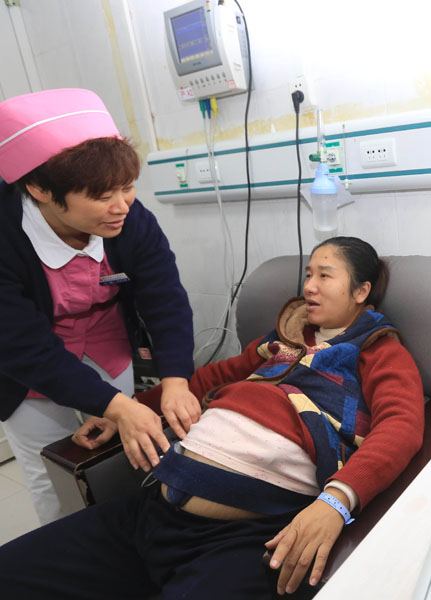Pregnant women to receive improved access to services
 |
|
A nurse checks a pregnant woman at a hospital in Xiangyang, Hubei province, on Saturday.[GONG BO/ FOR CHINA DAILY] |
Maternal mortality in China slightly above US, but far lower than other developing countries
China's top health authority will take steps in the next few years to improve maternal health, as mortality rates have risen following the adoption of the universal second-child policy in January.
The National Health and Family Planning Commission said that 89,000 obstetrics beds will be added to hospitals across China, and local health authorities will be guided to optimize their resources.
The commission will also help local authorities improve their ability to save pregnant women and newborn babies in critical condition, and better equip hospital obstetrics and pediatrics departments to deal with emergencies, the commission said.
The commission will select some national training bases for midwifery techniques and organize emergency training to help pregnant women in critical condition. The commission will cooperate with other departments in the training of obstetricians and midwives, aiming to produce 140,000 more in the next few years, it said.
More than 8.3 million babies were born in the first half of the year in China.
The maternal mortality rate in China in the first half of the year was 183 deaths per 1 million population, a rise of more than 30 percent over the same period last year, the commission said.
That's slightly higher than the rate in the United States - 140 deaths per million population last year - but far less than the average maternal mortality rate in developing countries globally, which was 2,390 per million last year, according to the World Health Organization.
The WHO defines maternal mortality as "the death of a woman while pregnant or within 42 days of termination of pregnancy".
At the end of last year, China's top leadership approved a change in national policy to allow all couples to have a maximum of two children.
Of the 90 million women who became eligible to have a second baby, 60 percent are more than 35 years old, a group considered to be subject to greater risk, according to the commission.
The increase in the number of pregnant women, particularly of those at higher risk, such as older women, has resulted in an increase in maternal deaths in the first half of the year, the commission said.
In addition, the sudden rise in pregnancy also put new strains on maternal health services, and both facilities and hospital staff are underequipped, the commission said.
Gu Hong, a pediatrician at Beijing's Anzhen Hospital, said the number of pregnant women with cardiovascular complications received by the hospital has been increasing in the past few years, and seven pregnant women died from complications in the hospital in the past five years.
"The situation is serious," she said. "Now more women are trying their best to have a second child, including some who face life-threatening risks, such as those with serious cardiovascular disease."



















